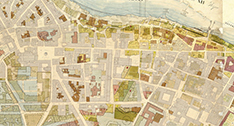The Department of Architecture’s research lines pursue multiple objectives, oriented towards basic issues, with clear educational and methodological aims, and applicative in-depth studies, aimed at technical and specialist aspects of the relevant disciplines, therefore with an approach that supports the multidisciplinary nature of the schools of architecture.
The 64 professors of the department gather together a rich and varied multi-disciplinary knowledge that allows research groups to not only tackle conventional themes, but also develop perspectives of absolute originality.
The conscious management of the process of transformation of the contemporary city, its environment, territory, centre, periphery and its old and new, built-up and open, public and private, man-made and natural spaces, demands a command of multiple analytical and interpretative tools and intervention techniques, and, above all, the acquisition of a clear vision of the whole.
In addition to historical, constructive and urban competences, there are economic, technological, energetic and environmental aptitudes that must be acquired in order to develop an ability to interact and deal with often very seemingly distant disciplines and specializations. Framing the figure of the architect, and his or her future contribution to society, within such a composite field requires shrewd foundation choices to be made, due to both the changing panorama of job opportunities, and the various levels of sometimes very high specialization typical of certain sectors.
The department, therefore, focuses on themes of architecture and the city open to multi-disciplinary, educational and scientific collaborations, essential for covering the field of action and knowledge, with a structure designed to channel the diversification of cultural interests in a coherent and synergistic multidisciplinary approach. The research activities of the department are divided into three main lines:
 Architecture and heritage
Architecture and heritage
This research line brings together a set of interests, commitments and didactic, cultural, professional and research experiences, tied to scientific, theoretical, applied and design aspects, gained over many years by the professors who have joined the department, and aims, above all, to develop a modern and more fruitful relationship between architecture and the various disciplines of expertise in the fields of cultural heritage and the interpretation of the historical stratification of contemporary landscapes, involving history, restoration, design, particular fields of mathematics, structural knowledge, architectural and urban composition and urban planning. All this in the awareness that architecture, in its various philological and interpretative declinations, has as its central objective not only the understanding and conservation of constructive heritage and the anthropized landscape, but also their revitalization, updating, innovation and reintegration into the context of uses and current and future cultural and practical needs. In this perspective, and in the belief that this field of research can express and promote the cultural and scientific role that distinguishes Italian culture in the international arena, the architectural project is investigated with breadth and without dogmatism, in its various practices and with mutable theoretical, cognitive and methodological tools, in the context of its historical development, permanence and evolutionary viewpoints.
 Architecture, science and innovation
Architecture, science and innovation
It is clear that to conceive and create architectures, technical knowledge, though variable in time and space, offers a powerful repertoire of operational tools. Perhaps less evident is that scientific knowledge, which certainly constitutes a significant part of contemporary culture, can also play a decisive role in design inventions. These should not only be perceived as necessary tools for governing intervention processes and techniques, but also, and above all, as a methodological model that contributes to enriching the range of tools available to architecture. In an era that tends to separately cultivate knowledge and specialization, a unifying vision of processes is often lacking, and there is a risk of an unaware and perhaps improper use of technical tools. In defining training and educational courses as well as in carrying out research activities, it is, therefore, extremely important to seek a synthesis of heterogeneous disciplinary skills.
The Department of Architecture believes, in particular, that research and the use of innovation must be accompanied by adequate scientific knowledge, in order to be aware of and functional to an architecture that responds to the needs of contemporary society. The teaching and research carried out by members of the department in scientific and technical fields are oriented in this sense, in the belief, moreover, that architecture is a privileged area of study in which extremely different aspects of knowledge can contribute to the formation of multifaceted professional figures.
 Urban and territorial studies
Urban and territorial studies
This is research line concerns the set of habitational and environmental conditions that articulate and accompany urbanization processes. Fields of reflection and research are thus brought together in a high level of cooperation between various research units, and in collaborations and agreements with important institutional, scientific and entrepreneurial partners, at both national and international level. Particular attention is paid to the system of local and territorial autonomous bodies, and the institutions of Lazio and the metropolitan area of Rome, with which various collaborations are in place. The research topics range from policies and plans for territorial governance to the sustainable development of territorial economies, from the history of the city and the territory to the urban project and its morpho-typological, functional and meaningful connotations, from infrastructural policies to landscape and agricultural planning, from landscape planning to open space design, from environmental assessment to reflections on common assets and the production of public assets, from contemporary city living to urban art, and from forms of collective participation to public planning and deliberation. A specific area of research, of a highly interdisciplinary nature, also relates to the energetic and environmental sustainability of built and settled environments, with particular regard to actions of mitigation and adaptation in response to the effects of climate change.
